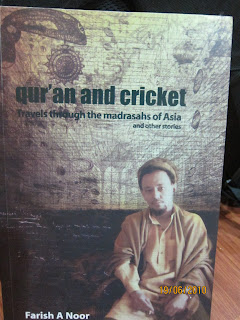
This is the latest book I managed to finish reading. Actually, I finished it quite a while back but I did not find the inspiration to blog about it. Not that I'm overly inspired right now but since I'm about to finish reading another book, I thought I better blog about this one quickly.
Biodata of the author from Wikipedia:
Dr. Farish Ahmad Noor (born 15 May 1967 in Georgetown, Penang, Malaysia) is a Malaysian political scientist and historian and is presently a Senior Fellow at the Nanyang Technological University in Singapore.It is a pity that a person having such credentials did not find it attractive to offer his services to Malaysian universities. Even if he did, I don't think he can last long as his views would most probably be not in tune with the powers that be.
He was formerly attached to Zentrum Moderner Orient (Centre for Modern Oriental Studies) in Berlin, Germany, Sciences-Po Paris, the Institute for the Study of Muslim Society (ISIMM, Ecole des haute etudes et sciences sociale, EHESS), Paris and the International Institute for the Study of the Muslim World (ISIM), Leiden, Netherlands. Dr. Noor's teaching credits include the Centre for Civilisational Dialogue, University of Malaya, the Institute for Islamic Studies, Free University Berlin, Sunan Kalijaga Islamic University (Jogjakarta), Muhamadiyah University Surakarta and Nanyang Technological University presently.
He received his BA in Philosophy & Literature from the University of Sussex in 1989, before studying for an MA in Philosophy at the same University in 1990, an MA in South-East Asian Studies at the School of Oriental and African Studies in London, before completing his PhD at the University of Essex in 1997 in the field of governance and politics.
In this book, Farish writes about his travels to the various madrasahs and religious places of the world to "study" the way f life at these places. His trip took him to Pakistan, Kashmir, Sri Lanka, Jogjakarta, Solo, Surakarta, Saigon, Turkey, Amsterdam, Cairo, the Desert of Libya, Kuala Trengganu, Kota Bharu, Patani, Narathiwat, Tamil Nadu and Kerala. Its a good tour indeed.
The journey took the writer, among others, to Darul Oloom where Tuan Guru Nik Aziz had his studies. He also met up with Ustaz Abu Bakar Bashir of JI fame. He roamed the places where the Ottoman rulers used to reign supreme and also maybe the land where The Lion of the Desert, Umar Mukhtar used to fight the Italians and died a syahid. He was also involved in rescue efforts during the earthquake that hit the Indian subcontinent.
There are several chapters that left special impressions on me such as when he was in Turkey where he noted the following:
In practically every Muslim country I've visited, nostalgia and authenticity cast their spells. From Morocco to Pakistan to Indonesia, ordinary Muslims - be they taxi drivers, school teachers, or clerks - seem ever so inclined to return to the past to escape, albeit momentarily, the squalid realities of the present.
I also like Farish's take on the general election of 2008 when he was in Trengganu and Kota Bharu such as this:
The large screen that projects rhe live report by TV3 announces that Lim Kit Siang, leader of DAP has won. For half a second there was silence. Then the rebel yell is raised, "Takbir, Allahuakbar, Allahuakbar, Allahuakbar"....Who would have thought that here in Kota Bharu, a thousand PAS supporters would be cheering on their allies, the DAP?
Overall, the book was a good read plus it provides valuable insights into the happenings of the places visited by the writer. Farish writing make for easy reading though at times I feel he did spice things up a bit.
2 comments:
I feel that it is really a shame.. when educators feel the need to censor themselves in this country. During the last election, almost all of my classmates were.. UMNO totok. When Selangor fell to PR they ridiculed and made some remarks, to the point of saying after this all Selangorians have to wear serban/purdah etc. I had a hard time biting my tongue.
Anyway, my lecturers did not comment at all during the campaign, but after the election some were saying "tak sia-sia saya balik kampung" etc. Some of my classmates that time were dumbfounded that their lecturers did not support "Ketuanan Melayu". We could have some interesting discussions right there but nothing came out of it.
But these classmates of mine, most of them did not even register to vote. Cakap kosong je lah.
Thanks for the visit, Lin.
That's the problem with country now, even at the highest educational institutions, we cannot discuss about everyday things, unless it is in support of the ruling party. How are we to improve.
Just look at the irony, a supposedly educated person (a university student) cannot take part in politics but a person who failed his PMR of the same age can become Ketua Pemuda.
Things must change and it is up to the young like you who must do it. For a start get them to register to vote. Tapi kalau nampak masih totok tak payah register pun takper.
Post a Comment